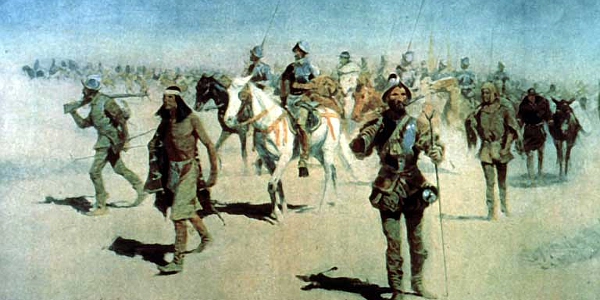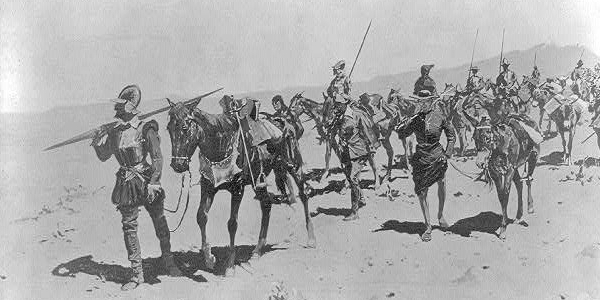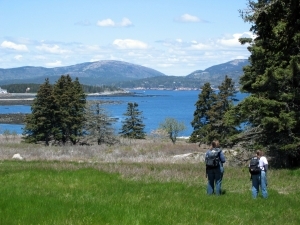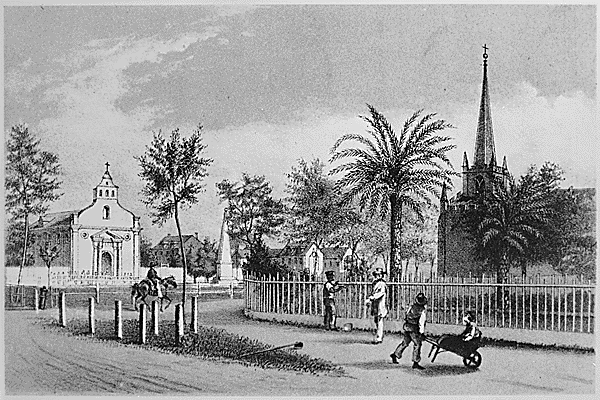Sponsor this page. Your banner or text ad can fill the space above.
Click here to Sponsor the page and how to reserve your ad.
-
Timeline
Detail - 1541
April 23, 1541 - The Coronado expedition continues to search for the city of Quivira and traverses the states of Arizona, New Mexico, Texas, and Oklahoma until their final destination near Lyons, Kansas. At this time, they were only a few hundred miles from the exploration by de Soto.

It had been two years since the first full explorations by the Spanish to the north of their territory in the New Spain territories of Mexico, beginning with Marcos de Niza and Melchior Diaz in 1539, and Coronado was still searching for his city of gold. There had been the ongoing Tiguex War with the Tiwa at their southwest pueblos for a year in the area of Arizona and New Mexico, halting some of the progress that Coronado wanted in his explorations further east. By the spring of 1541, Coronado had established his base camp in Palo Duro Canyon, located in today's Texas. He had heard of another possible lost city of gold called Quivira in today's Kansas. The news had been given to the Spanish by a captured slave, El Turco, who told of the riches. There were fish the size of horses and jugs made of gold. The expedition headed north on April 23, 1541 toward Cicuye.
Nine days later, they reached the Great Plains. For thirty-five days they continued to search for the great cities of gold that El Turco had described, but found nothing. Suspicion that El Turco was lying grew; he finally confessed that there was such a city, but it was not as prosperous and golden as he had described. It was to the north, another month's journey.
Lacking food, Coronado chose a smaller group to continue forward, sending the remaining back to Tiguex. The small group within the expedition, thirty mounted men, six soldiers on foot, and Juan de Padilla, the Franciscan father, marched north on June 1, 1541, traversing the panhandles of Oklahoma and Texas. They crossed the Arkansas River on June 29, traveling for forty-two days until arriving at Quivira.
But Quivira was not even as prosperous as the lowered expectations had stated. Yes, there were permanent settlements of Indian tribes, but their sustenance was predicated on corn and buffalo hides, which the men of the expedition referred to as woolly or shaggy cows. The expedition remained in the villages for twenty-five days into the month of August, then returned to the main force. The area, noted Coronado in his report to the King, was rich in agricultural means. It was not, however, one of mineral wealth. It is thought that the territory of Quivira was on the south-eastern side of the border between Kansas and Nebraska, and that at one time the expedition camped near the city of Lyons, Kansas with the Quivira villages reaching northeast to Salina.

Coronado Letter to the King of Spain, October 21, 1541
Holy Catholic Caesarian Majesty: On April 20 of this year I wrote to Your Majesty from this province of Tiguex, in reply to a letter from Your Majesty dated in Madrid, June 11 a year ago. I gave a detailed account of this expedition, which the viceroy of New Spain ordered me to undertake in Your Majesty's name to this country which was discovered by Friar Marcos de Nixza, the provincial of the order of Holy Saint Francis. I described it all, and the sort of force I have, as Your Majesty had ordered me to relate in my letters; and stated that while I was engaged in the conquest and pacification of the natives of this province, some Indians who were natives of other provinces beyond these had told me that in their country there were much larger villages and better houses than those of the natives of this country, and that they had lords who ruled them, who were served with dishes of gold, and other very magnificent things; and although, as I wrote Your Majesty, I did not believe it before I had set eyes on it, because it was the report of Indians and given for the most part by means of signs, yet as the report appeared to me to be very fine and that it was important that it should be investigated for Your Majesty's service, I determined to go and see it with the men I have here. I started from this province on the 23d of last April, for the place where the Indians wanted to guide me.
After nine days' march I reached some plains, so vast that I did not find their limit anywhere that I went, although I traveled over them for more than 300 leagues. And I found such a quantity of cows in these, of the kind that I wrote Your Majesty about, which they have in this country, that it is impossible to number them, for while I was journeying through these plains, until I returned to where I first found them, there was not a day that I lost sight of them.
And after seventeen days' march I came to a settlement of Indians who are called Querechos, who travel around with these cows, who do not plant, and who eat the raw flesh and drink the blood of the cows they kill, and they tan the skins of the cows, with which all the people of this country dress themselves here. They have little field tents made of the hides of the cows, tanned and greased, very well made, in which they live while they travel around near the cows, moving with these. They have dogs which they load, which carry their tents and poles and belongings. These people have the best figures of any that I have seen in the Indies. They could not give me any account of the country where the guides were taking me. I traveled five days more as the guides wished to lead me, until I reached some plains, with no more landmarks than as if we had been swallowed up in the sea, where they strayed about, because there was not a stone, nor a bit of rising ground, nor a tree, nor a shrub, nor anything to go by. There is much very fine pasture land, with good grass. And while we were lost in these plains, some horsemen who went off to hunt cows fell in with some Indians who also were out hunting, who are enemies of those that I had seen in the last settlement, and of another sort of people who are called Teyas; they have their bodies and faces all painted, are a large people like the others, of a very good build; they eat the raw flesh just like the Querechos, and live and travel round with the cows in the same way as these. I obtained from these an account of the country where the guides were taking me, which was not like what they had told me, because these made out that the houses there were not built of stones, with stories, as my guides had described it, but of straw and skins, and a small supply of corn there. This news troubled me greatly, to find myself on these limitless plains, where I was in great need of water, and often had to drink it so poor that it was more mud than water. Here the guides confessed to me that they had not told the truth in regard to the size of the houses, because these were of straw, but that they had done so regarding the large number of inhabitants and the other things about their habits. The Teyas disagreed with this, and on account of this division between some of the Indians and the others, and also because many of the men I had with me had not eaten anything except meat for some days, because we had reached the end of the corn which we carried from this province, and because they made it out more than forty days' journey from where I fell in with the Teyas to the country where the guides were taking me, although I appreciated the trouble and danger there would be in the journey owing to the lack of water and corn, it seemed to me best, in order to see if there was anything there of service to Your Majesty, to go forward with only 30 horsemen until I should be able to see the country, so as to give Your Majesty a true account of what was to be found in it.
I sent all the rest of the force I had with me to this province, with Don Tristan de Arellano in command, because it would have been impossible to prevent the loss of many men, if all had gone on, owing to the lack of water and because they also had to kill bulls and cows on which to sustain themselves. And with only the 30 horsemen whom I took for my escort, I traveled forty-two days after I left the force, living all this while solely on the flesh of the bulls and cows which we killed, at the cost of several of our horses which they killed, p582because, as I wrote Your Majesty, they are very brave and fierce animals; and going many days without water, and cooking the food with cow dung, because there is not any kind of wood in all these plains, away from the gullies and rivers, which are very few.

It was the Lord's pleasure that, after having journeyed across these deserts seventy-seven days, I arrived at the province they call Quivira, to which the guides were conducting me, and where they had described to me houses of stone, with many stories; and not only are they not of stone, but of straw, but the people in them are as barbarous as all those whom I have seen and passed before this; they do not have cloaks, nor cotton of which, to make these, but use the skins of the cattle they kill, which they tan, because they are settled among these on a very large river. They eat the raw flesh like the Querechos and Teyas; they are enemies of one another, but are all of the same sort of people, and these at Quivira have the advantage in the houses they build and in planting corn. In this province of which the guides who brought me are natives, they received me peaceably, and although they told me when I set out for it that I could not succeed in seeing it all in two months, there are not more than 25 villages of straw houses there and in all the rest of the country that I saw and learned about, which gave their obedience to Your Majesty and placed themselves under your royal overlordship.
The people here are large. I had several Indians measured, and found that they were 10 palms in height; the women are well proportioned and their features are more like Moorish women than Indians. The natives here gave me a piece of copper which a chief Indian wore hung around his neck; I sent it to the viceroy of New Spain, because I have not seen any other metal in these parts except this and some little copper bells which I sent him, and a bit of metal which looks like gold. I do not know where this came from, although I believe that the Indians who gave it to me obtained it from those whom I brought here in my service, because I can not find any other origin for it nor where it came from. The diversity of languages which exists in this country and my not having anyone who understood them, because they speak their own language in each village, has hindered me, because I have been forced to send captains and men in many directions to find out whether there was anything in this country which could be of service to Your Majesty. And although I have searched with all diligence I have not found or heard of anything, unless it be these provinces, which are a very small affair. The province of Quivira is 950 leagues from Mexico. Where I reached it, it is in the fortieth degree. The country itself is the best I have ever seen for producing all the products of Spain, for besides the land itself being very fat and black and being very well watered by the rivulets and springs and rivers, I found prunes like those of Spain [or I found everything they have in Spain] and nuts and very good sweet grapes and mulberries.
I have treated the natives of this province, and all the others whom I found wherever I went, as well as was possible, agreeably to what Your Majesty had commanded, and they have received no harm in any way from me or from those who went in my company. I remained twenty-five days in this province of Quivira, so as to see and explore the country and also to find out whether there was anything beyond which could be of service to Your Majesty, because the guides who had brought me had given me an account of other provinces beyond this. And what I am sure of is that there is not any gold nor any other metal in all that country, and the other things of which they had told me are nothing but little villages, and in many of these they do not plant anything and do not have any houses except of skins and sticks, and they wander around with the cows; so that the account they gave me was false, because they wanted to persuade me to go there with the whole force, believing that as the way was through such uninhabited deserts, and from the lack of water, they would get us where we and our horses would die of hunger. And the guides confessed this, and said they had done it by the advice and orders of the natives of these provinces. At this, after having heard the account of what was beyond, which I have given above, I returned to these provinces to provide for the force I had sent back here and to give Your Majesty an account of what this country amounts to, because I wrote Your Majesty that I would do so when I went there. I have done all that I possibly could to serve Your Majesty and to discover a country where God Our Lord might be served and the royal patrimony of Your Majesty increased, as your loyal servant and vassal.
For since I reached the province of Cibola, to which the viceroy of New Spain sent me in the name of Your Majesty, seeing that there were none of the things there of which Friar Marcos had told, I have managed to explore this country for 200 leagues and more around Cibola, and the best place I have found is this river of Tiguex where I am now, and the settlements here. It would not be possible to establish a settlement here, for besides being 400 leagues from the North sea and more than 200 from the South sea, with which it is impossible to have any sort of communication, the country is so cold, as I have written to Your Majesty, that apparently the winter could not possibly be spent here, because there is no wood, nor cloth with which to protect the men, except the skins which the natives wear and some small amount of cotton cloaks. I send the viceroy of New Spain an account of everything I have seen in the countries where I have been, and as Don Garcia Lopez de Cardenas is going to kiss Your Majesty's hands, who has done much and has served Your Majesty very well on this expedition, and he will give Your Majesty an account of everything here, as one who has seen it himself, I give way to him. And may Our Lord protect the Holy Imperial Catholic person of Your Majesty, with increase of greater kingdoms and powers, as your loyal servants and vassals desire.
From this province of Tiguex, October 20, in the year 1541. Your Majesty's humble servant and vassal, who would kiss the royal feet and hands:
FRANCISCO VAZQUEZ CORONADO.
Image above: "Coronado Sets Out for the North," painting by Frederic Remington, 1890-1900. Courtesy Wikipedia Commons. Photo below: "Coronado's March," drawing by Frederic Remington, 1897. Courtesy Library of Congress. Source info: "Francisco Vazquez de Coronado," 2019, history.com; pbs.org; Kansas State Historical Society; "The Coronado Expedition, 1540-1542.
Excerpted from the Fourteenth Annual Report of the Bureau
of Ethnology to the Secretary of the Smithsonian
Institution, 1892-1893, Part 1," George Parker Winship; Wikipedia.





